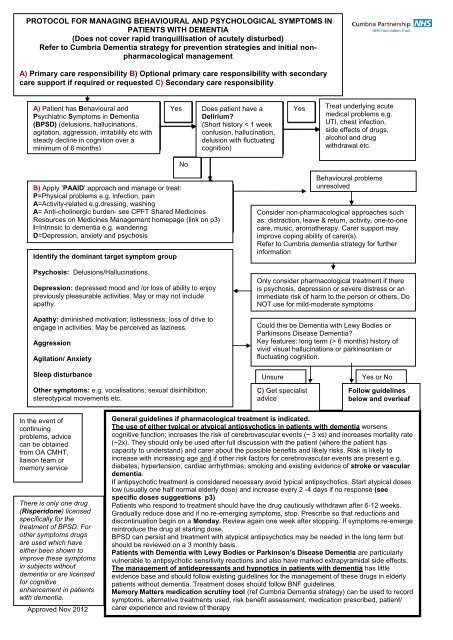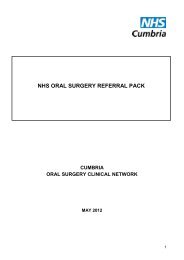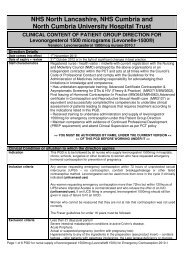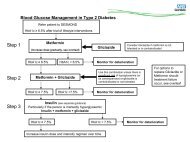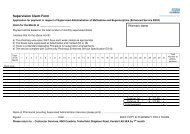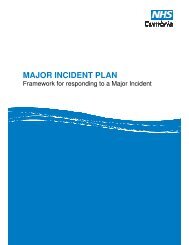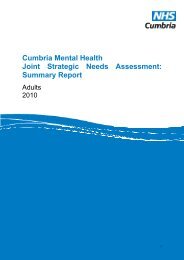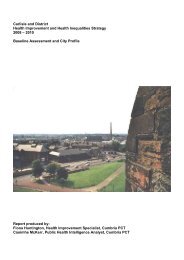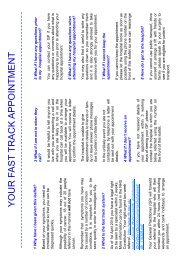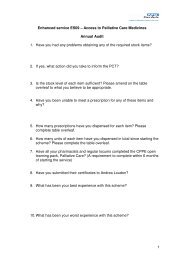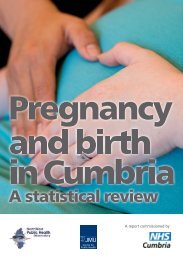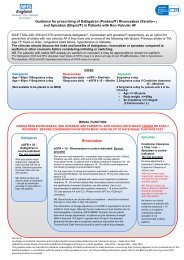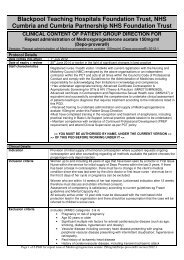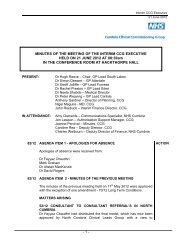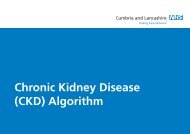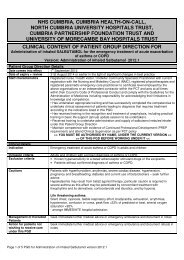BPSD guidance - NHS Cumbria
BPSD guidance - NHS Cumbria
BPSD guidance - NHS Cumbria
Create successful ePaper yourself
Turn your PDF publications into a flip-book with our unique Google optimized e-Paper software.
PROTOCOL FOR MANAGING BEHAVIOURAL AND PSYCHOLOGICAL SYMPTOMS IN<br />
PATIENTS WITH DEMENTIA<br />
(Does not cover rapid tranquillisation of acutely disturbed)<br />
Refer to <strong>Cumbria</strong> Dementia strategy for prevention strategies and initial nonpharmacological<br />
management<br />
A) Primary care responsibility B) Optional primary care responsibility with secondary<br />
care support if required or requested C) Secondary care responsibility<br />
A) Patient Patient has has Behavioural and and<br />
Psychiatric Psychological Symptoms Symptoms in Dementia in Dementia<br />
(<strong>BPSD</strong>) (delusions, (e.g. psychosis; hallucinations, aggression;<br />
agitation, depression aggression, combined irritability with a decline etc with in<br />
steady cognition decline over six in cognition month) over a<br />
minimum of 6 months)<br />
Yes<br />
Does patient also have have a a<br />
Delirium?<br />
(Short history < 21 weeks<br />
confusion, hallucinations, hallucination, delusions or<br />
delusion apathy with with fluctuating<br />
cognition)<br />
Yes<br />
Treat underlying acute<br />
medical problems e.g.<br />
UTI, chest infection,<br />
side effects of drugs,<br />
alcohol and drug<br />
withdrawal etc.<br />
No<br />
B) Apply ‘PAAID’ approach and manage or treat:<br />
Apply ‘PAIN’ approach and manage or treat:<br />
P=Physical<br />
P=Physical<br />
problems<br />
problems<br />
e.g.<br />
e.g.<br />
infection,<br />
infection,<br />
pain<br />
pain<br />
A=Activity-related<br />
A=Activity-related<br />
e.g.dressing,<br />
e.g.dressing,<br />
washing<br />
washing<br />
A=<br />
I =Iatrogenic<br />
Anti-cholinergic<br />
e.g. side<br />
burdeneffects<br />
see<br />
of drugs<br />
CPFT<br />
e.g.<br />
Shared<br />
anticholinergics<br />
Medicines<br />
Resources<br />
N= Noise and<br />
on<br />
other<br />
Medicines<br />
environmental<br />
Management<br />
factors<br />
homepage<br />
e.g. lighting.<br />
(link on p3)<br />
I=Intrinsic to dementia e.g. wandering<br />
D=Depression, anxiety and psychosis<br />
Identify the dominant target symptom group<br />
Identify<br />
Psychosis: Delusions/Hallucinations.<br />
Identify<br />
IIIII<br />
Depression: depressed mood and /or loss of ability to enjoy<br />
previously pleasurable activities. May or may not include<br />
apathy.<br />
Apathy: diminished motivation; listlessness; loss of drive to<br />
engage in activities. May be perceived as laziness.<br />
Aggression<br />
Agitation/ Anxiety<br />
Behavioural problems<br />
unresolved<br />
Consider non-pharmacological approaches such<br />
as: distraction, leave & return, activity, one-to-one<br />
care, music, aromatherapy. Carer support may<br />
improve coping ability of carer(s).<br />
Refer to <strong>Cumbria</strong> dementia strategy for further<br />
information<br />
Only consider pharmacological treatment if there<br />
is psychosis, depression or severe distress or an<br />
immediate risk of harm to the person or others. Do<br />
NOT use for mild-moderate symptoms<br />
Could this be Dementia with Lewy Bodies or<br />
Parkinsons Disease Dementia?<br />
Key features: long term (> 6 months) history of<br />
vivid visual hallucinations or parkinsonism or<br />
fluctuating cognition.<br />
Sleep disturbance<br />
Other symptoms: e.g. vocalisations; sexual disinhibition;<br />
stereotypical movements etc.<br />
Unsure<br />
C) Get specialist<br />
advice<br />
Yes or No<br />
Follow guidelines<br />
below and overleaf<br />
In the event of<br />
continuing<br />
problems, advice<br />
can be obtained<br />
from OA CMHT,<br />
liaison team or<br />
memory service<br />
There is only one drug<br />
(Risperidone) licensed<br />
specifically for the<br />
treatment of <strong>BPSD</strong>. For<br />
other symptoms drugs<br />
are used which have<br />
either been shown to<br />
improve these symptoms<br />
in subjects without<br />
dementia or are licensed<br />
for cognitive<br />
enhancement in patients<br />
with dementia.<br />
Approved Nov 2012<br />
General guidelines if pharmacological treatment is indicated.<br />
The use of either typical or atypical antipsychotics in patients with dementia worsens<br />
cognitive function; increases the risk of cerebrovascular events (~ 3 xs) and increases mortality rate<br />
(~2x). They should only be used after full discussion with the patient (where the patient has<br />
capacity to understand) and carer about the possible benefits and likely risks. Risk is likely to<br />
increase with increasing age and if other risk factors for cerebrovascular events are present e.g.<br />
diabetes; hypertension, cardiac arrhythmias; smoking and existing evidence of stroke or vascular<br />
dementia.<br />
If antipsychotic treatment is considered necessary avoid typical antipsychotics. Start atypical doses<br />
low (usually one half normal elderly dose) and increase every 2 -4 days if no response (see<br />
specific doses suggestions p3)<br />
Patients who respond to treatment should have the drug cautiously withdrawn after 6-12 weeks.<br />
Gradually reduce dose and if no re-emerging symptoms, stop. Prescribe so that reductions and<br />
discontinuation begin on a Monday. Review again one week after stopping. If symptoms re-emerge<br />
reintroduce the drug at starting dose.<br />
<strong>BPSD</strong> can persist and treatment with atypical antipsychotics may be needed in the long term but<br />
should be reviewed on a 3 monthly basis.<br />
Patients with Dementia with Lewy Bodies or Parkinson’s Disease Dementia are particularly<br />
vulnerable to antipsychotic sensitivity reactions and also have marked extrapyramidal side effects.<br />
The management of antidepressants and hypnotics in patients with dementia has little<br />
evidence base and should follow existing guidelines for the management of these drugs in elderly<br />
patients without dementia. Treatment doses should follow BNF guidelines.<br />
Memory Matters medication scrutiny tool (ref <strong>Cumbria</strong> Dementia strategy) can be used to record<br />
symptoms, alternative treatments used, risk benefit assessment, medication prescribed, patient/<br />
carer experience and review of therapy
Prescribing Guidelines for <strong>BPSD</strong> in Dementia<br />
For all cases of agitation and aggression in dementia, pain relief i.e. Paracetamol 1g tds should be seriously considered<br />
as an alternative to the medications below.<br />
Husebo et al published a recent Norwegian study in the BMJ which showed analgesia significantly reduced<br />
agitation/aggression compared to controls- BMJ 2011;343:d 4065- http://www.bmj.com/content/343/bmj.d4065<br />
Alzheimer’s Disease.<br />
Approved Nov 2012<br />
Key symptom<br />
First line<br />
Evidence<br />
Evidence<br />
Second line<br />
type<br />
type<br />
Depression<br />
Sertraline, 2 – 3 + £ Mirtazapine 3<br />
Citalopram#<br />
Apathy<br />
Sertraline, 2 – 3 + £ Donepezil S ; Rivastigmine 2<br />
Citalopram#<br />
S ; Galantamine S<br />
Psychosis Risperidone 1 Olanzapine; Aripiprazole; 2<br />
Memantine S<br />
Aggression<br />
Risperidone L<br />
Haloperidol<br />
1<br />
2<br />
Olanzapine, Aripiprazole;<br />
Carbamazepine,<br />
Lorazepam Memantine S 2<br />
2<br />
Moderate Agitation/ Anxiety Citalopram. # 3 Trazadone; Lorazepam; 2-4<br />
Mirtazapine; Memantine<br />
Severe Agitation/ Anxiety Risperidone, 1 Aripiprazole, Olanzapine, 2 - 4<br />
Poor sleep<br />
Temazepam;<br />
Zopiclone.<br />
Dementia with Lewy Bodies or Parkinson’s disease dementia.<br />
Memantine S Lorazepam.<br />
3 + £ Zolpidem 3<br />
Key symptom<br />
First line<br />
Evidence<br />
Evidence<br />
Second line<br />
type<br />
type<br />
Depression Citalopram# 4 + £ Sertraline 4<br />
Apathy<br />
Sertraline, 4 + £ Donepezil S ;<br />
2<br />
Galantamine S<br />
Citalopram#<br />
Rivastigmine S ;<br />
Psychosis* Rivastigmine S . 2 - 3 Quetiapine S<br />
3<br />
Donepezil S ;<br />
Galantamine S ..<br />
Clozapine S<br />
Aggression Quetiapine. 3 Rivastigmine S<br />
3-4<br />
Donepezil S ; Galantamine S<br />
Lorazepam<br />
Moderate Agitation/ Anxiety Citalopram.# 3 + £ Rivastigmine S .<br />
2 - 4<br />
Sertraline<br />
Donepezil S<br />
Galantamine S Lorazepam<br />
Severe Agitation/ Anxiety Quetiapine. 3 Rivastigmine S<br />
3-4<br />
Donepezil S ; Galantamine S<br />
Lorazepam<br />
Poor sleep<br />
Temazepam; 3 + £ Zolpidem 3<br />
Zopiclone.<br />
REM sleep behaviour Clonazepam** 3<br />
(nightmares; hyperactivity)<br />
* consider reducing antiparkinsonian medication first. ** 500-1000 microgram nocte<br />
L = Licensed indication S = Secondary care initiation or recommendation under shared care<br />
# If considering Citalopram, note MHRA <strong>guidance</strong> (contra-indication with antipsychotic and max dose in elderly 20mg) (link on p 3)<br />
Evidence levels: 1 = Meta-analysis; 2 = RPCT’s; 3 = Other studies; 4 = Expert opinion; £=cost<br />
Please note the use of mood stabilisers/anticonvulsants has very limited evidence to support use. Use should be<br />
restricted to patients where other treatments are contra-indicated or ineffective.<br />
Vascular dementia or stroke related dementia.<br />
There is little evidence base for the treatment of <strong>BPSD</strong> in Vascular dementia or stroke related dementia. The cholinesterase<br />
inhibitors (Donepezil; Rivastigmine; Galantamine) and Memantine are not licensed for the treatment of vascular dementia and<br />
should not be used. Prescribers are advised to follow the <strong>guidance</strong> for Alzheimer’s disease but to use with extreme caution drugs<br />
with an established increased cerebrovascular risk (i.e. antipsychotics)<br />
Other <strong>BPSD</strong> and other dementias (e.g. Fronto-temporal lobe dementia).<br />
There is little evidence base for the treatment of other <strong>BPSD</strong> or for the treatment of common <strong>BPSD</strong> in other dementias.<br />
Specialist advice should be sought.<br />
Drug dose guidelines for antipsychotics and anxiolytics in dementia.
Start at minimum recommended dose and titrate according to response (usually every 2-4 days) to maximum tolerated<br />
dose. Cautious withdrawal may be initiated at 6-12 weeks. See guidelines on page 1 of this <strong>guidance</strong>.<br />
Drug Starting dose Maximum dose<br />
Risperidone** 500 microgram o.d.* 1mg b.d.<br />
Olanzapine 2.5mg o.d. 10mg daily<br />
Quetiapine 25mg o.d. 25-300mg daily<br />
Aripiprazole 5mg o.d. 10mg daily<br />
Haloperidol** 0.5mg bd-tds oral/IM 1mg tds oral/IM<br />
Lorazepam 0.5 mg – 1mg bd oral/IM 1mg bd oral/IM ***<br />
* BNF dose250microgram bd<br />
** Do not use haloperidol or risperidone in established or suspected Parkinson’s disease or Lewy Body Dementia<br />
*** elderly max dose<br />
Citalopram and escitalopram warning letter MHRA November 2011<br />
http://www.mhra.gov.uk/Safetyinformation/Safetywarningsalertsandrecalls/Safetywarningsandmessagesformedicines/Mo<br />
nthlylistsofinformationforhealthcareprofessionalsonthesafetyofmedicines/CON134744<br />
Anti-cholinergic burden- see Shared Medicines Resources on Medicines Management intranet pages<br />
http://cptportal.cumbria.nhs.uk/SiteDirectory/MedicinesManagement/Web%20Pages/Shared%20Medicines%20Resources.<br />
aspx<br />
Further resources:<br />
efns.org (European Federation of Neurological Societies)<br />
ipa-online.org (International Psychogeriatric Association)<br />
Approved: <strong>Cumbria</strong> Partnership <strong>NHS</strong> Foundation Trust Medicines Management Committee September 2012<br />
<strong>Cumbria</strong> Area Prescribing Committee October 2012<br />
Date for review November 2014 (or sooner if relevant <strong>guidance</strong> changes)<br />
Based on 1.CSM CEM/CMO/2004/1(MHRA); 2.BNF (2008); 3.Faculty of Old Age Psychiatry (2008); 4. Maudsley Guidelines 2012; 5.NICE-SCIE guidelines;<br />
6. SIGN 2006: 6. Ballard C , Current Opinions in Psychiatry 2009: Cochrane review of antipsychotics in dementia 2001/2010.<br />
Acknowledgement to Prof C Holmes and Dr S Muthalagu, - March 2009 (Hampshire Guidelines), Dr S Wright, Ms Sue Wright, April 2011 (Rotherham guidelines)<br />
Approved Nov 2012


